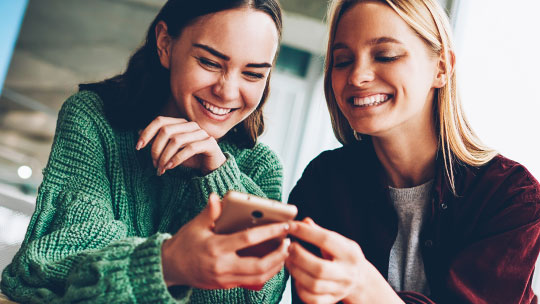
Experts Talk: The Influence of Social Media on Relationships
With more and more people spending so much time on social media, there are increasing worries about how sites like Facebook might be affecting our relationships. It’s not uncommon for relationships to break down because of social media use, though many couples have got together as a result of using these sites. We spoke to a number of relationship experts to find out what they thought about the impact of social media on dating, love and romance.
Social media in everyday life

The symptoms of a perfect life created by social media - how this can impact an average person's life?
One of the main reasons social media has affected so many relationships is because it constantly presents images of so-called ‘perfect lives’ to us. Many people believe social media has left people with unrealistic ideas of what their lives and relationships should be like. Sex, gender and pop culture writer Lauren Rosewarne said that seeing the often “idealised lives” of others can create feelings of jealousy and envy. Rosewarne also points that social media users can easily start feeling like their own lives are failing in comparison to those of their online friends. Even though we know our social media friends are presenting a “highly curated” highlights reel of their lives, these feelings can be tough to let go.
Therapist Brie Shelly says those that only post positive content about their lives on social media may make weaker connections than others. Shelley suggests some individuals may fail to have “stronger connections with others in their life because most people can't connect to people with ‘perfect’ lives”. A study carried out by Kaspersky Lab found that social media was making people less happy. The research found that social media users were spending around two hours per day on social media. 42% of respondents felt jealous when they saw their friends receiving more ‘likes’ than themselves, with 59% experiencing sadness after seeing images of events they were not invited to. 45% felt unhappy when they looked at pictures of their friends’ foreign trips and holidays, with 37% feeling sad when they looked at pictures of their past. This was because they felt they were no longer as happy. In the US, 1 in 7 divorces has been linked to sketchy social media activity. Many people cite social media as making them more anxious and depressed. Let’s find out more about the relationship between social media and anxiety next.
Can social media be the reason for anxiety?
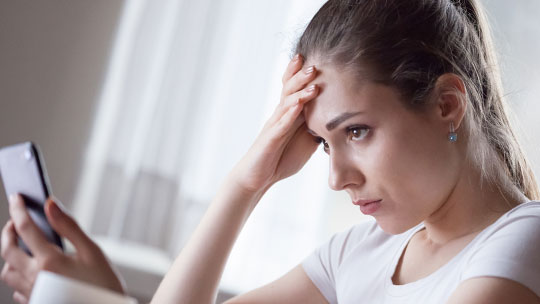
There is strong evidence to suggest that social media is a big cause of anxiety and the responses from our experts can only prove this. Marriage and family therapist Tina B. Tessina told us that people can feel anxious if they feel they can’t compete with the exaggerated images they see. Dona Murphy from dstnytarot.com , a life and relationship coach, felt social media delivered an “expectation of perfection” that made users feel fearful they could not measure up to these “impossible” and “non-existent” standards. The relationship coach Doc Love told us his opinion summarizing it with a fantastic thought that social media can cause us to be judged and become the victim of misinterpreted observations.
According to Hashim Ilyas, many of the billions of social media users around the world were likely to be vulnerable to posts that depict “perfect lives”. In his experience, people commonly felt distressed when they saw images of wealth, great social and family lives. People may start to overthink about failing to match up with them financially or socially. But can social media actually improve our self-esteem if it is used correctly?
How to use social media to increase self-esteem and improve your life?
Even the biggest critics of social media would admit that it does come with some benefits. Tina B. Tessina described social media as a good source for information on “learning better emotional habits and improving life”. She advised social media users experiencing anxiety to follow the most reputable pages for advice on managing anxiety to limit the negative impact of these services.
Author and relationship expert Kevin Darné urged social media users to remember that they are on a “personal journey”, telling them they can become “free” once they have learned to stop competing with others. According to Darné, people can become happy for others and still take pleasure in celebrating their own successes along the way. He said people must remember that the vast majority of their online friends and contacts were virtual and had no real presence as people in their day-to-day lives. Although many people have hundreds of online acquaintances and few real-life face-to-face friends, he says individuals only require a “small group of loving trustworthy individuals to be happy and fulfilled”. He also encourages users to allow others’ accomplishments to inspire and motivate them rather than leave them feeling jealous and envious.
Another warning came from Brie Shelly. She urges us to pay attention to how big a role social media is playing in their lives. She says some users may underestimate how much time they are spending using social media apps. Users are encouraged to spend an hour or two without their phone, try to spend a weekend away from social media or even delete their social media apps for a few days. When you take these steps, you will notice how many times you reach for your phone without realising it. Shelly also encourages individuals to use tools to monitor their social media and phone use and find out how much time they are really spending on sites like Facebook. Many users express shock after seeing these figures.
Once you find out what your level of attachment is, you can decide whether you want to reduce your social media use. Does your mood change when you decrease your use? Some people have improved their mental well-being by limiting their screen time, reducing the volume of their use and only checking their phone at set times of the day. You can even move your apps to another part of your phone to make them harder to find. She says her clients’ self-esteem regularly improves when they become more aware of their screen time levels and make efforts to reduce them.
Looking for love online
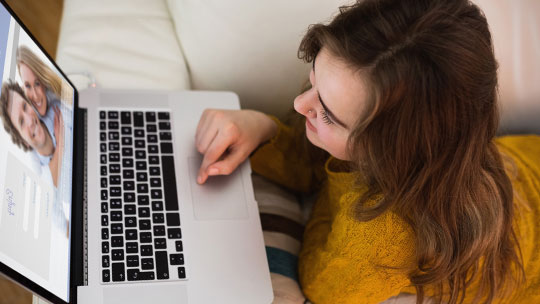
How does social media affect our dating?
After studying the influence of social media on our everyday life and reading the opinion of our experts we didn’t expect to hear about a positive impact of social media on dating. Unfortunately, our expectations were backed up by the experts’ words. For example Tina B. Tessina says social media gives us “false impressions of what to expect from dating and relationships” and a dating expert, TED speaker and start-up founder Hayley Quinn told us that it has changed our approach to dating on several levels. It can make us feel more pressurised to source the perfect profile picture or make us feel there is an endless supply of possibly more suitable partners out there. It’s argued that this can make us less likely to work on making our existing relationships successful. Kevin Darné says attempts to seek love on social media services can backfire, as most people do not see them as dating sites.
Is it better to look for a partner on social media or a dating site?
Everybody knows that both dating sites and social media are becoming more and more popular each year. The evergreen questions is whether it is possible to find a date on social media? Can we transfer our love life to Facebook, Instagram and Twitter or is it better to stick to dating websites where other users looking for dates? Dating coach Wendy Newman says online dating platforms can be better environments for finding love as they give you useful information on who is available and likely to be compatible with us. At the same time in Hayley Quinn’s view, both options can play a big role in helping us find love, suggesting that singles shouldn’t “close down any potential options” for meeting people. She recommends that single users should get an online dating profile but also clean up their social media page and continue to go out in real life. On the other hand Dona Murphy says both can be misleading with regards to what a user is really like, but that social media can present “more realistic” portrayals of people and their lives. However, she says the fact that most dating sites are not free can help you to meet genuine people. Darné basically agrees with Wendy and says most people don’t use social media to find love. You could be left feeling embarrassed if you do attempt to flirt with someone on Facebook or Twitter. However, if you have met someone you want to get to know better on social media and have arranged to meet up with them, you can look at their profile page to find out whether to proceed.
What to look for on the profile page of your date?
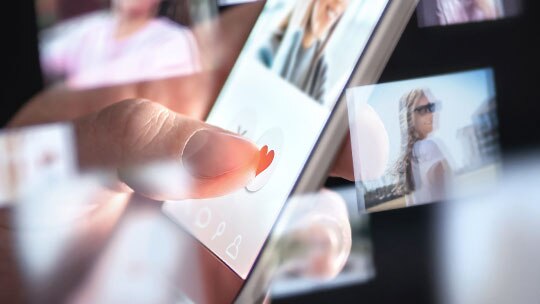
As discussed above, social media can be a great source of information and you can get acknowledged of your potential date’s lifestyle and hobbies from their social media profile. Tina B. Tessina says people should expect profile pages to be exaggerated and untrue. She says individuals should meet people in real life to find out who they really are. Dona Murphy advices singles seeking love on social media: “look for evidence of intelligence and humour” if these things are important to them. Valerie O’Ryan , another relationship coach, urges users to seek out people who are “positive and optimistic” rather than “negative and judgemental”. According to Valerie “negative and judgemental” people in social media are either rude in real life or have a low self-esteem while being protected by the screen of the PC they are not afraid of expressing their real inner selves. Kevin Darné suggests us to create a list of positive and negative traits of character we want to see in our potential partner. “People can benefit from looking out for “red flags” and creating a “must-have” list.” He also urges users to be wary of people with professional-looking headshots or dated clothing, as these photos could have been stolen, or they could be very old pictures of themselves. Dating expert Debbie Rivers encourages people to avoid stalking someone’s timeline when they are seeking a new mate or have started a new relationship with them, as they could come across things that leave them feeling insecure or jealous. This definitely doesn’t mean we should risk with our safety and security.
What are the main rules of safety when searching for a date online?
Our world is obviously a pretty dangerous place and the invention of online dating and social media made it much easier to hide your real personality. This is why you have to be very careful when you meet up for the first time after chatting online. Valerie O’Ryan instructs users to only meet people in public places when they are just getting to know them. Don’t get in a car with someone during the early stages or let them know where you live. Doc Love advises people to reduce the risk of conflict by avoiding the heavy subjects like race, religion, sex and politics on first dates, and to avoid put-downs and criticism. Another important thing is to keep your friends and relatives informed. Brie Shelly tells daters to always let friends and family know where they are going before a date. Snapchat maps and similar services can help your friends locate you. Text an hour or so into the date to let them know you are okay. Always make sure you have an escape route just in case you do need to exit quickly. Also, Debbie Rivers advises people to avoid giving away too much personal information to strangers and to have a short voice chat with them beforehand so they can decide whether to proceed with the date.
Social media in everyday life

What is the influence of social media on ongoing relationships?
Some couples have found it hard to maintain privacy in the social media age. Tension can arise if one partner shares more information about the relationship than the other is happy with. Dona Murphy says not everything needs to be shared, no matter how good or bad it is, and that certain things should stay between the two partners, keeping it “special and private”. Tina B. Tessina suggests people should avoid comparing their relationship to the ones portrayed on social media. Kevin Darné says online flirting has caused many problems within relationships, with some people even reacting badly after seeing their partner “like” certain photos. He says many non-social media users now expect their mates to avoid it too. Hashim Ilyas says problems can arise when someone spends more time on social media than their partner approves of, especially when this results in them receiving less attention. Some couples have clashed when one partner has prematurely gone ‘public’ with their relationship on social media.
When is the right time to show your relationships in social media?
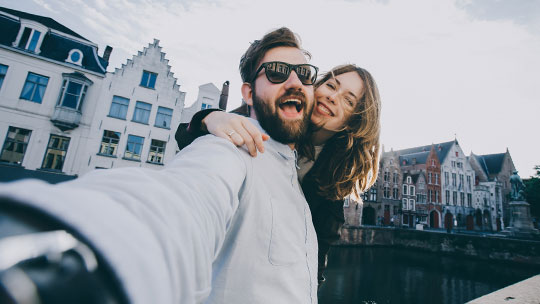
Cognitive scientist and author Art Markman says couples need to decide how they want to approach social media. Should one partner decide they don’t want information about their relationship placed online, the other needs to respect this. He suggests couples should wait until the relationship is properly established before it is acknowledged on social media. Wendy Newman reminds individuals that once your new relationship status is mentioned on social media, it is more or less officially “out-there”. This can be difficult for those who only want a select few people to know about their dating activities. Hayley Quinn says “showing your relationship online is not a necessity”, whilst Doc Love says you should “never” announce it. Hashim Illyas says it’s important to let your friends and family know about the relationship before you make it official on social media. There’s always a chance that one partner will use social media more than the other, so you may well need to have a conversation about your approach to Facebook, Twitter and other services to maintain a harmonious relationship.
How to define that you are using too much social media in relationships?
Spending too much time on social networks can be a stumbling block for you relationship. According to Kevin Darné, couples should only communicate with each other via social media when it is necessary to do so. Exchanging messages in Facebook with other people during your family dinner definitely doesn’t look like something normal. Debbie Rivers suggests we should think carefully about “liking” our ex’s posts once we are in a new relationship, and to avoid sharing relationship problems and arguments online for the world to see. This can become a real problem and bring lots of troubles. Hashim Ilyas says we should think about limiting our social media use if our partner starts to comment on the amount of time we are spending on our phones and the sites themselves.
Breaking up in the modern world
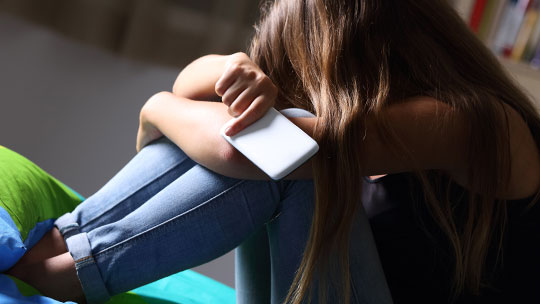
Why do people feel more confident breaking up via social media?
It often seems that people find it much easier to end a relationship online than they do in person. Lauren Rosewarne says relationships that start online can be weaker because we are not normally part of shared offline networks. This means ending the relationship either explicitly or simply ghosting the other person is much more straightforward. Brie Shelly says most people just don’t have the skills to navigate confrontation, which is why they tend to head straight to their phones when they want to bring things to an end. Others may simply engage in practice of ‘ghosting’.
What is ghosting and what can it lead to?
In ghosting, someone ceases to respond to texts, messages and calls rather than telling them they no longer want them in their lives. As technology creates distance between people, ghosting someone is an easy way of closing something down, according to Art Markman. However, this behaviour is often regarded as immature and cowardly. Markman urges people to learn to have difficult conversations if they want to establish healthy relationship patterns. Kevin Darné says ghosting is not actually a new phenomenon, and that people have always ended relationships by simply ignoring the other person. He says the increased debate about ghosting is a result of more people sharing their experiences online. Brie Shelly says ghosters can feel incredibly guilty and uncomfortable when they are forced to face the other person, and that those on the receiving end can feel considerable anxiety and stress, with their self-esteem taking a big dent too. It’s always better to look to the future rather than the past when it comes your love life – though social media has made it far too easy to see what it is happening in our former partners’ lives.
Keeping an eye on your ex's life through social media – what are the consequences?
Social media has made it easier for us to find out what our exes are doing with their lives. However, this can be dangerous. Art Markman recommends that social media users avoid looking at their ex’s profiles. He says this behaviour can make it harder to move forward in life and can heighten feelings of jealousy and anger. Tina B. Tessina says looking at your ex’s profile can result in finding out things you are better off not knowing and can prevent you from letting go and Kevin Darné says that your current relationship could be in big trouble if you do visit your former partner’s profile and your new mate discovers this. If your ex finds out, they could unfriend or block you, or they may even report you if they think this is part of a wider pattern of stalking. Unless you genuinely now see them as a platonic friend and are on good terms, it may well be best to stay away from their profile.
Conclusion
Experts seem to agree that too much time on social media can be detrimental to a relationship. If you do want your relationship to work, it may well be best to limit your time on social media and ensure you are putting enough time and effort into making it a success. Try to avoid looking at your ex’s profiles, think carefully about what you are posting if it is likely to offend or irritate your partner and don’t feel rushed into becoming ‘official’ on social media when you do start a new relationship. Avoid comparing your love life to that of others and try to turn your phone off more often when spending quality time with a partner. It is also best to use dating sites when you want to find love as opposed to social media apps. Remember, when you look at someone else’s page you are viewing a highly-curated highlights reel which may bear little resemblance to reality, so try to focus on your own relationship and no-one else’s. By using social media responsibly and perhaps sparingly, you can limit or eliminate any negative impact it has on your love life.